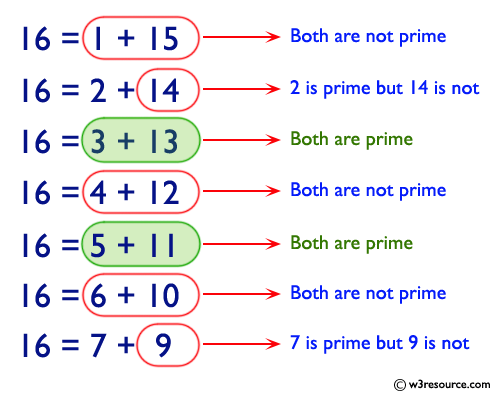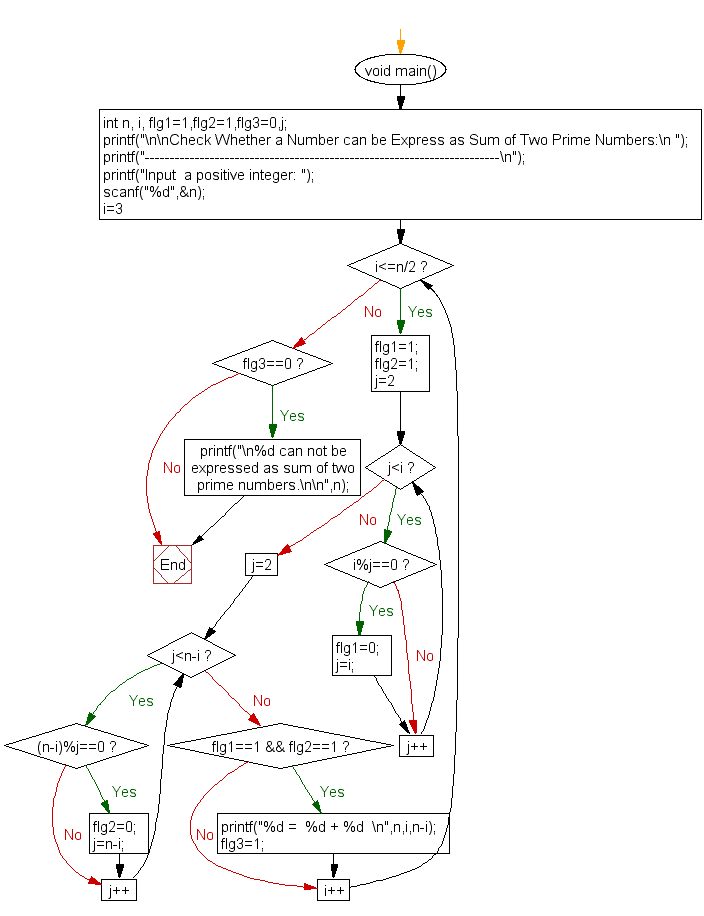C Exercises: Check whether a number can be express as sum of two prime numbers
C For Loop: Exercise-56 with Solution
Write a program in C to Check Whether a Number can be Express as Sum of Two Prime Numbers.
Pictorial Presentation:

Sample Solution:
C Code:
#include <stdio.h>
#include <stdlib.h>
#include <math.h>
int main()
{
int num,i,j,temp1,temp2,ctr=0;
printf("input the number:\n");
scanf("%d",&num);
for(i=2;i<=num/2;i++){
temp1=i;
temp2=num-i;
for(j=2;j<=i/2;j++){
if(i%j==0){ctr++;break;}
}
if(ctr==0){
for(j=2;j<=(num-i)/2;j++){
if((num-i)%j==0){ctr++;break;}
}
if(ctr==0) printf("%d can be written as %d + %d.\n ",num,i,num-i);
}
ctr=0;
}
return 0;
}
Sample Output:
input the number: 16 16 can be written as 3 + 13. 16 can be written as 5 + 11.
Flowchart:

C Programming Code Editor:
Improve this sample solution and post your code through Disqus.
Previous: Write a program in C to convert a decimal number to hexadecimal.
Next: Write a program in C to print a string in reverse order.
What is the difficulty level of this exercise?
Test your Programming skills with w3resource's quiz.
C Programming: Tips of the Day
Static variable inside of a function in C
The scope of variable is where the variable name can be seen. Here, x is visible only inside function foo().
The lifetime of a variable is the period over which it exists. If x were defined without the keyword static, the lifetime would be from the entry into foo() to the return from foo(); so it would be re-initialized to 5 on every call.
The keyword static acts to extend the lifetime of a variable to the lifetime of the programme; e.g. initialization occurs once and once only and then the variable retains its value - whatever it has come to be - over all future calls to foo().
Ref : https://bit.ly/3fOq7XP
- New Content published on w3resource:
- HTML-CSS Practical: Exercises, Practice, Solution
- Java Regular Expression: Exercises, Practice, Solution
- Scala Programming Exercises, Practice, Solution
- Python Itertools exercises
- Python Numpy exercises
- Python GeoPy Package exercises
- Python Pandas exercises
- Python nltk exercises
- Python BeautifulSoup exercises
- Form Template
- Composer - PHP Package Manager
- PHPUnit - PHP Testing
- Laravel - PHP Framework
- Angular - JavaScript Framework
- Vue - JavaScript Framework
- Jest - JavaScript Testing Framework
